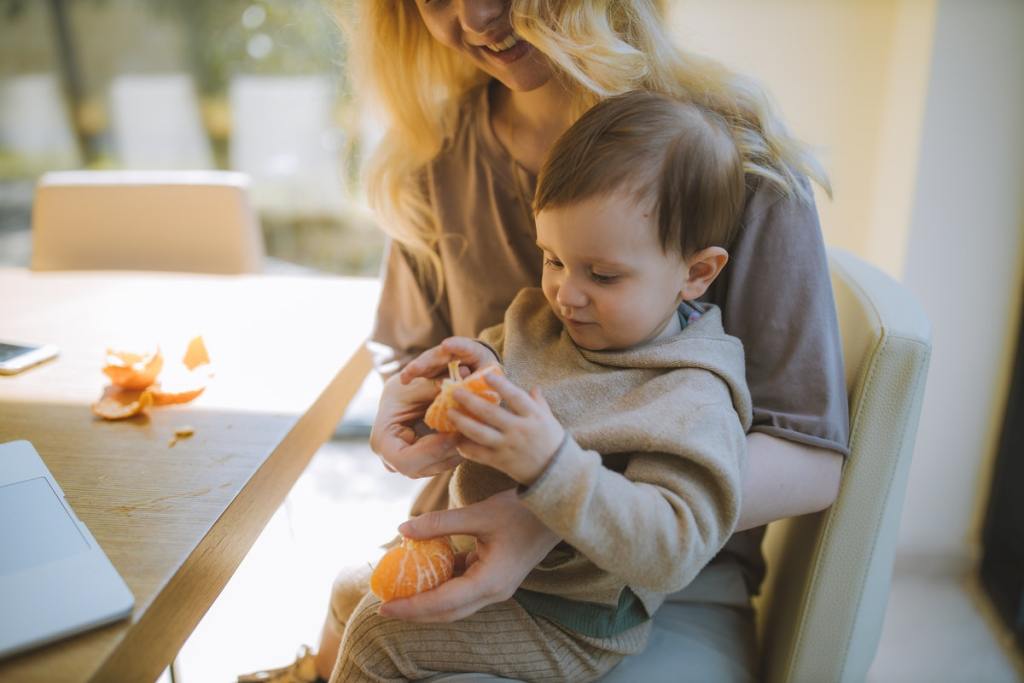Fruits are one of the most popular first foods, but a few of them aren’t recommended to give along with the rest right away. Oranges are one of them. Can babies have oranges? Good question. If you’re wondering when can babies have oranges specifically as opposed to other fruits, read on.
There are a couple of reasons to be cautious before deciding to give oranges to your baby and some factors to consider in how you prepare them when you do give it to them. We have the facts and some suggestions to walk you through what you need to know.

Can babies have oranges?
They may just seem like any other fruit, but there are a couple of factors about feeding babies oranges specifically to give parents pause. Just like you have to consider the shape of grapes or the constipation risk of bananas, but still feed those fruits to littles ones by cutting them up or serving in moderation (respectively), you can still feed oranges to babies eating solids after some prep.
The two main issues with oranges for babies are acidity and consistency. The acidity may be too much for babies’ delicate stomachs and the stringiness and the tricky-to-chew membrane are difficult for early eaters. However, you can prepare oranges in other ways such as adding orange zest to chicken or muffins or adding orange juice to smoothies or popsicles. You can also peel the orange out of the membrane and feed it without the clear skin within the tough skin to your baby to make it easier for them to eat/ You can also moderate the amount they eat to keep the acidity issue at bay.
When can babies have oranges?
According to WebMd, oranges can be introduced by the time baby is a year old as long as they’re given in specific ways. You might want to wait until 12 months old since the acidity may just be too much and could cause acid reflux or diaper rash. As a stringy, pulpy fruit unlike mild melon, oranges are not the best choice for an early fruit before one year of age even if you remove the seeds and membrane that can be a choking hazard.
Even after six or 12 months you should still help your toddler with the membrane and watch for any seeds and strings (and of course still peel it first). Cut the orange into small slices for them. You can use it in smoothies and other recipes in addition to serving it raw as a way to incorporate it into your child’s diet.
While we might think of orange juice as a go-to for kids and it was even marketed to us as a healthy choice for getting Vitamin C, fruit juices are another sugary drink like sodas and are not the best way to get vitamins to kids. According to healthychildren.org, the American Academy of Pediatrics recommends not giving kids under one-year-old any fruit juice. After their birthday, you can make your own orange juice at home by pureeing oranges and straining the juice so you don’t get added sugar or preservatives. It’s best to dilute the juice with water to cut the acidity.

What are some orange recipes for babies?
If you want to avoid the stringy membranes of serving a plain orange but still want to give your baby the nutritious benefits of oranges, here are some ways you can prepare it:
- Orange popsicles
- Fruit smoothie
- Orange banana mash
- Orange yogurt
- Carrot orange puree
You don’t need strict recipes all the time, just mix some mashed or pureed orange or orange juice in with other purees, juices, or foods.
What are other sources of Vitamin C?
If your child is eating solids but not quite ready for oranges and you want to stay away from sugary fruit juice, here are some other whole foods that have Vitamin C that are safe for babies under 12 months that are not citrus fruits:
- Bell pepper
- Broccoli
- Cantaloupe
- Guava
- Kale
- Kiwi
- Papaya
- Peas
- Strawberry
- Sweet potato
- Tomato
- Watermelon
The bottom line on oranges
While oranges may be a delicious, nutritious, and refreshing snack for adults, they are just too acidic for young babies just starting on solid foods. There are plenty of alternatives and when they are mixed into purees or other recipes in small amounts it shouldn’t be a problem. Watch for your baby’s sensitivity to other acidic foods and if they tolerate them well, you can probably go ahead with oranges, too. Once you hit the one-year mark, it should be smooth sailing for citrus fruits, but introduce them slowly to make sure your little one’s stomach doesn’t get too upset by them.



